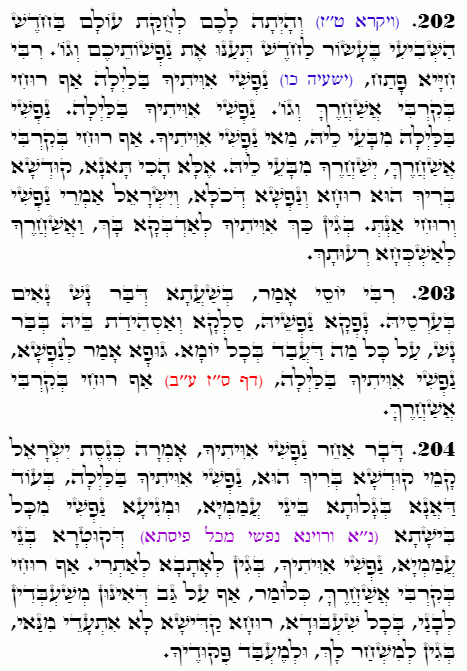Daily Zohar # 4640 – Acharei Mot – I have desired You in the night
Daily Zohar 4640

Hebrew translation:
203. רַבִּי יוֹסֵי אָמַר, בְּשָׁעָה שֶׁאָדָם יָשֵׁן בְּמִטָּתוֹ, יוֹצֵאת נַפְשׁוֹ, עוֹלָה וּמְעִידָה בָּאָדָם עַל כָּל מַה שֶּׁעָשָׂה בְּכָל הַיּוֹם. הַגּוּף אוֹמֵר לַנֶּפֶשׁ: נַפְשִׁי אִוִּיתִךָ בַּלַּיְלָה, אַף רוּחִי בְקִרְבִּי אֲשַׁחֲרֶךָּ.
204. דָּבָר אַחֵר נַפְשִׁי אִוִּיתִךָ – אָמְרָה כְּנֶסֶת יִשְׂרָאֵל לִפְנֵי הַקָּדוֹשׁ בָּרוּךְ הוּא: נַפְשִׁי אִוִּיתִךָ בַּלַּיְלָה, בְּעוֹד שֶׁאָנוּ בַּגָּלוּת בֵּין הָעַמִּים, וּמְנוּעָה נַפְשִׁי מִכָּל רַע (וְשָׂבְעָה נַפְשִׁי מִכָּל הַבִּזְיוֹנוֹת) שֶׁקְּשׁוּרָה בֵּין הָעַמִּים, נַפְשִׁי אִוִּיתִךָ, כְּדֵי לָשׁוּב לִמְקוֹמִי. אַף רוּחִי בְקִרְבִּי אֲשַׁחֲרֶךָּ, כְּלוֹמַר, אַף עַל גַּב שֶׁהֵם מְשַׁעְבְּדִים אֶת בָּנַי בְּכָל שִׁעְבּוּד, רוּחַ הַקֹּדֶשׁ לֹא זָזָה מִמֶּנִּי כְּדֵי לְשַׁחֵר אוֹתְךָ וְלַעֲשׂוֹת מִצְווֹתֶיךָ.
.
Zohar Acharei Mot
Continued from previous DZ
#202
Leviticus 16:29
“וְהָיְתָה לָכֶם לְחֻקַּת עוֹלָם בַּחֹדֶשׁ הַשְּׁבִיעִי בֶּעָשׂוֹר לַחֹדֶשׁ תְּעַנּוּ אֶת נַפְשֹׁתֵיכֶם וְכָל מְלָאכָה לֹא תַעֲשׂוּ הָאֶזְרָח וְהַגֵּר הַגָּר בְּתוֹכְכֶם.”
“This shall be a statute forever for you: In the seventh month, on the tenth day of the month, you shall afflict your souls and do no work at all, whether a native of your own country or a stranger who dwells among you.”
Rabbi Chiya opened and said:
Isaiah 26:9
“נַפְשִׁי אִוִּיתִיךָ בַּלַּיְלָה אַף רוּחִי בְקִרְבִּי אֲשַׁחֲרֶךָּ כִּי כַּאֲשֶׁר מִשְׁפָּטֶיךָ לָאָרֶץ צֶדֶק לָמְדוּ יֹשְׁבֵי תֵבֵל.”
“With my soul, I have desired You in the night, Yes, by my spirit within me I will seek You early; For when Your judgments are in the earth, The inhabitants of the world will learn righteousness.”
He asks, “My soul longs for You in the night?” Shouldn’t it say, “My soul in the night?” What does “My soul longs for You” mean? Similarly, regarding “Yes, my spirit within me seeks You diligently,” it should say “seeks You” instead of “seeks You diligently.” He answers: This is what we have learned: The Holy One, blessed be He, is the spirit and soul of all. And Israel says, “You are my soul and my spirit,” and therefore they say, “I long for You to cleave to You.” And “I seek You diligently,” meaning to find Your will.
Notes:
Rabbi Chiya begins by analyzing the verse, “My soul longs for You in the night; Yes, my spirit within me seeks You diligently.” He questions the wording, suggesting that it could have been more straightforward, but then explains a deeper meaning: The Holy One is the life force, the spirit and soul of all beings. When Israel prays, they express a desire to cleave to God, recognizing Him as their source of life. The phrase “I seek You diligently” reflects their deep yearning to align with Hashem’s will, particularly during times of spiritual darkness or challenge (“in the night”).
#203
Rabbi Yossi said: When a person sleeps in their bed, their soul departs and ascends, bearing witness to the person’s actions throughout the day. Therefore, the body says to the soul, “My soul longs for You in the night,” meaning at the time when you leave me. “Yes, my spirit within me seeks You diligently.”
#204
The Congregation of Israel said before the Holy One, blessed be He: “My soul longs for You in the night,” meaning, while I am in exile among other nations, and I have restrained my soul from all the evil associated with the other nations, “my soul longs for You,” in order to return to my place. “Yes, my spirit within me seeks You diligently,” meaning that even though they enslave my children with all kinds of oppression, the Holy Spirit does not depart from them in order to visit You and fulfill Your commandments.
Notes:
The Congregation of Israel speaks to God, expressing its yearning for connections even during exile. The metaphor of “night” refers to the time of exile, when Israel is among the nations. Despite being surrounded by temptations and oppression, Israel strives to avoid sin and remains dedicated to returning to its rightful place. The Holy Spirit remains with Israel, guiding them to continue observing the commandments despite the hardships of exile. This represents the deep bond between Israel and Hashem, even in times of suffering and separation.
{||}

 Previous: Acharei Mot
Previous: Acharei Mot

